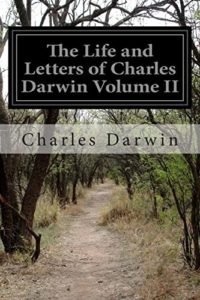
Twas not so long ago that I posted a review of the Life and Letters of Charles Darwin, Vol. 1. At the time, I said I was going to look and see if I had downloaded Vol. 2 and formatted it for Word. In fact, I had. I used the “Send to Kindle” app from Amazon and soon began reading it.
This volume covered the years from after the publication of Origin Of Species in 1859 to Darwin’s death in 1882. It includes a couple of appendixes, one listing Darwin’s publications: books, pamphlets, scientific papers, etc. In the same manner as Volume 1, the book is a mix of biography and letters. Darwin’s son Francis provides much commentary from personal experience. The letters, while extensive, are not more important than the biographical entries.
As this volume begins, Origin has just been published. The early part of the book concerns the next three years or so, when Darwin was being alternately praised and lambasted. Many people, including men or science, rejected Darwin’s findings. Some went partway, but others more or less said Darwin was a kook. Many of the letters are to two of Darwin’s best friends, Hooker and Huxley, both of whom took the lead in promoting evolution as a scientific reality. Another correspondent in this category was Asa Gray, an American.
As the years increased since the Origin was published, other subjects began to enter into the correspondence. Darwin had other books on totally different subjects that he published between 1859 and 1882. Many letters went out about these as he was conducting research, writing the books, dealing with the publisher, promoting the book, and discussing it with friends and colleagues. When it wasn’t bogged down with scientific names, this correspondence was quite captivating to me.
Occasionally, well, more than occasionally, the letters went beyond my comprehension. Here’s an example, from an 1860 letter.
The effect which the carbonate of ammonia produces is the segregation of the homogenous fluid in the cells into a cloud of granules and colourless fluid; and subsequently the granules coalescing, dividing, coalescing ad infinitum.
One thing that stood out to me was the almost religious nature of some of the letters, where evolution was the religions. Darwin frequently said things like, “Thank you for spreading our doctrine,” or “our doctrine has certainly caused reactions from many.” Those aren’t quotes from the book, but represent how Darwin wrote to several people.
Reviews of Darwin’s books, especially the Origin, was a frequent topic. Some of his correspondents were those not favorable to his “doctrine”. He was always patient with them in his letters, as if hoping to convert them by persuasion.
So, after having read both these volumes, what do I conclude? I’m glad I read them. It helped to flesh out some understanding of Darwin beyond what they say in science books. I don’t imagine I’ll ever re-read these, however. I give a combined rating of 3.5 stars. It would be 5 stars except for organization, and the sacrificing of letter space in favor of biography.